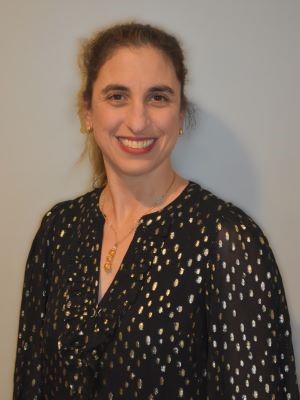
Romina (Principato) Profeta
PHYSICAL THERAPY
Graduated in 2001
Co-Owner
Tower Therapeutic Fitness and Wellness
Q: Why did you choose Wayne State University?
A: I attended WSU for my pre-physical therapy requirements, and I knew WSU had an excellent PT program and I wanted to stay home. I gambled on just applying to Wayne State's program and was so thrilled to be accepted.
Q: What inspired you to pursue PT?
A: Honestly it was my mom who asked me if I would be interested in physical therapy. I knew I wanted to go into health care but knew nothing about physical therapy. I volunteered at an outpatient clinic where a friend of the family worked and after a few times I knew this is where I belonged.
Q: Who was your most memorable instructor?
A: Without a doubt, it would be Fredrick Pociask, who I am still close with because I help lab assist Orthopedics II at WSU and I also help proctor. Fredrick challenged me with the content he taught, and it was because of him I decided to forgo my initial thought of specializing in pediatrics and decided to move towards orthopedics.
Q: What was your most challenging class?
A: My most challenging class was Orthopedics I and II with Fredrick. I learned so many challenging but effective techniques that have truly allowed me to help so many of my patients. Because of this class I decided to pursue a residency in manual therapy.
Q: Share some reflections about your time at Wayne State:
A: The time that I attended the physical therapy program was certainly challenging but I can't say enough about the professors as they truly prepared me to be the skilled therapist that I am today. I enjoyed the small class sizes. We became a tight-knit group and forged special relationships with each other as a class as well as with our professors.
Q: Share a career highlight or summary:
A: After graduation I took my first job working in outpatient orthopedics for St. John Hospital. I was very lucky to learn from the senior PTs who worked there. After practicing for about four years, I had the itch to return to school. I was considering going back to medical school but after much thought I felt like I was supposed to stay in physical therapy. I decided to complete my residency in orthopedic manual physical therapy and once I graduated, I took some time off and returned to complete my Doctorate in Physical Therapy. I switched jobs in 2006 and currently still work for the DMC, specifically Rehabilitation Institute of Michigan in their health club sites. I have also done some home care, which I really enjoyed and some auditing which I learned a lot from.
Along my career journey, Pilates was recommended to me. I started using that as a form of exercise and I fell in love with it. I decided to become Stott certified in Reformer and used that knowledge in the clinic. I took my knowledge as a physical therapist to help my patients become stronger and improve their body awareness. I started my own home studio six years ago and will be opening a rehab-based Pilates studio with my business partner in 2024. I have been blessed to help so many patients along their rehab journey. I couldn't have asked for a better profession. I love going to work every day. I look forward to making a difference with my studio in the coming months.
Physical therapists are dynamic health professionals who develop, coordinate and utilize select knowledge, skills and techniques in planning, organizing and directing programs for the care of individuals whose ability to function is impaired or threatened by disease or injury. The goal of PT is to enhance a person’s quality of life and their ability to participate in activities. The Doctor of Physical Therapy program application process opens July 1 and the deadline is Oct. 15. WSU Applebaum information meetings for prospective students take place at 6 p.m. on the first Tuesday of each month.
An anchor in urban health care
The Eugene Applebaum College of Pharmacy and Health Sciences is built on more than 100 years of tradition and innovation in the heart of Detroit. We have grown deep roots in our city, harnessing its powerhouse hospital systems and community service organizations as vibrant, real-world training grounds for students, with an ongoing focus on social justice in health care. And our research at all levels – from undergraduates to veteran faculty members – translates into creative solutions for healthier communities.
Wayne State University is a premier urban research institution offering approximately 350 academic programs through 13 schools and colleges to nearly 24,000 students.